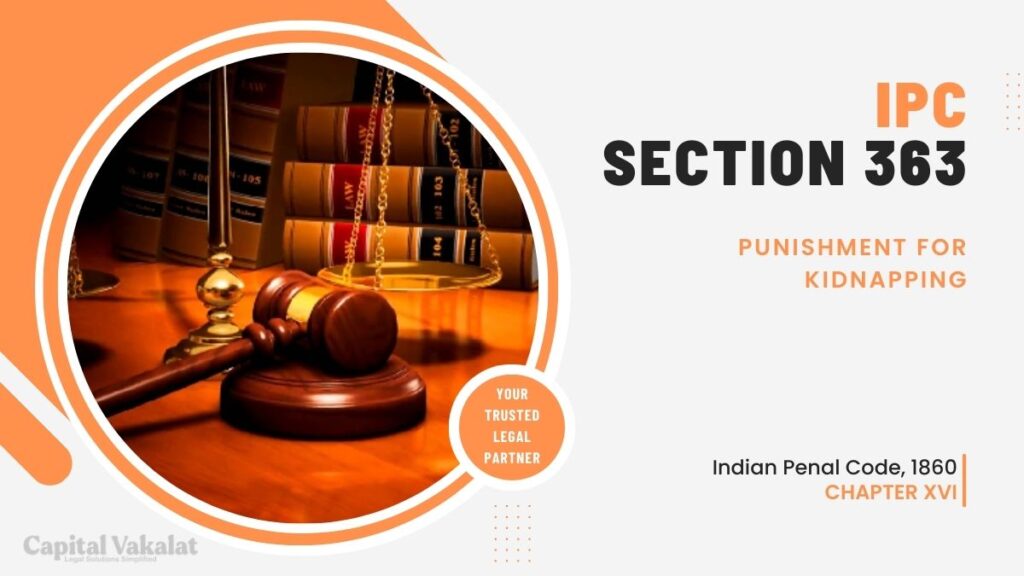Kidnapping, a grave offense under Section 363 of the Indian Penal Code (IPC), carries significant legal consequences for those found guilty. In this article, we will delve into the intricacies of Section 363 IPC, exploring the punishment, types of kidnapping covered, legal consequences, challenges in proving cases, preventive measures, landmark cases, and recent amendments.

Understanding the provisions of Section 363 IPC is crucial in navigating the legal landscape surrounding kidnapping offenses. Kidnapping, in legal terms, involves the abduction or illegal confinement of an individual against their will. Section 363 IPC specifically deals with the punishment for kidnapping, outlining the legal repercussions for those convicted.
Understanding Section 363 IPC
Overview of Section 363 IPC
Section 363 IPC is a cornerstone of Indian criminal law, addressing offenses related to the abduction or kidnapping of individuals. The section provides a framework for legal action against those who engage in such activities, emphasizing the importance of personal freedom and security.
Elements that Constitute the Offense
To establish an offense under Section 363 IPC, certain elements must be present. These may include the intent to restrain or confine, the absence of consent, and the removal or detainment of the individual from their lawful guardianship. Understanding these elements is essential in both legal proceedings and public awareness.
Punishment under Section 363 IPC
The punishment prescribed under Section 363 IPC varies based on the circumstances of the kidnapping. In cases where the kidnapped person is a minor, the severity of the punishment may increase. The legal consequences can range from imprisonment to fines, and factors such as the duration of the abduction and any harm caused to the victim play a crucial role in determining the sentence.
Types of Kidnapping Covered by Section 363 IPC
Kidnapping cases under Section 363 IPC can manifest in various forms. Whether it involves a minor taken without parental consent or an adult forcibly confined, understanding the nuances of different scenarios is vital. This section provides a comprehensive view of the types of kidnapping covered by the statute, shedding light on the diverse nature of such offenses.
Legal Consequences for Offenders
Beyond the immediate punishment, being convicted under Section 363 IPC has long-term consequences. A kidnapping conviction can leave a lasting mark on the offender’s criminal record, affecting employment opportunities and social standing. Exploring these legal consequences serves as a deterrent and emphasizes the gravity of the offense.
Challenges in Proving Kidnapping Cases
Proving a kidnapping case is not without its challenges. Legal complexities, lack of evidence, and the need for witness cooperation are common obstacles faced by law enforcement and prosecutors. This section explores the difficulties associated with proving kidnapping cases, offering insights into the intricacies of the legal process.
Prevention and Safety Measures
While legal repercussions are crucial, prevention is equally important. This section provides practical tips for individuals to minimize the risk of falling victim to kidnapping. Additionally, it highlights the collaborative efforts of communities and law enforcement in creating a safer environment.
Landmark Kidnapping Cases
Examining landmark kidnapping cases provides valuable insights into legal precedents and outcomes. By analyzing notable cases, readers can gain a deeper understanding of the judicial approach to such offenses and the evolving nature of kidnapping laws.
Recent Amendments and Changes
The legal landscape is dynamic, with statutes subject to amendments and updates. Any recent changes to Section 363 IPC are discussed in this section, exploring how these modifications impact the handling of kidnapping cases. Staying informed about legal updates is essential for both legal professionals and the general public.
Conclusion
In conclusion, Section 363 IPC plays a pivotal role in addressing and deterring kidnapping offenses. This article has explored the intricacies of the section, from its overview and elements to the punishment, types of kidnapping covered, legal consequences, challenges in proving cases, preventive measures, landmark cases, and recent amendments. The importance of legal awareness and vigilance cannot be overstated in fostering a safer society.
Frequently Asked Questions
Are there specific penalties for kidnapping minors under Section 363 IPC?
Yes, the punishment for kidnapping a minor is often more severe compared to cases involving adults, taking into account the vulnerability of the victim.
How can individuals enhance their personal safety to avoid kidnapping?
Personal safety measures include staying vigilant, avoiding isolated areas, and being cautious about sharing personal information.
Can a person be charged under Section 363 IPC for attempting to kidnap someone, even if the attempt is unsuccessful?
Yes, the law considers attempted kidnapping a serious offense, and charges can be filed even if the attempt is unsuccessful.